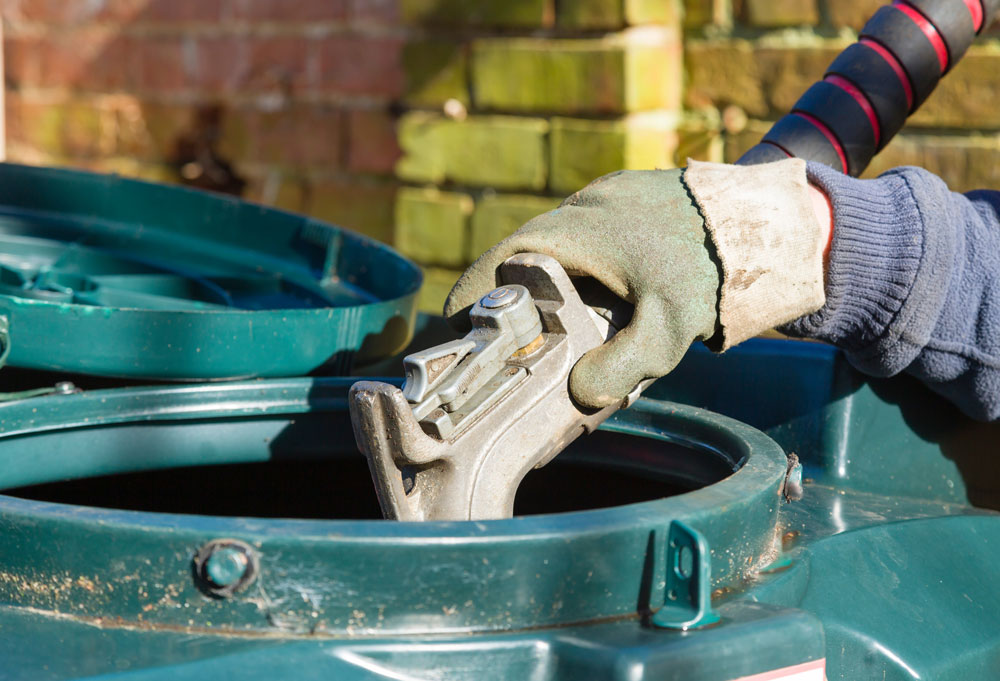How To Clean Up A Heating Oil Spill On Concrete
CONTENTS

- The effects of a heating oil spill on concrete
- The dangers of a heating oil spill
- Why heating oil spill clean up must be left to professional cleaners
- How to prevent a home heating oil spill
- Contact us today
Heating oil is usually either kerosene or petrol, both of which are harmful oils that are difficult to clean up. Fast, effective oil spill cleaning is essential to protect your health and property, and get rid of any stains.
Here at ICE Cleaning, we offer our oil spill cleaning services nationwide. Our technicians are fully permitted to handle and discard of a range of oils, and can clean surface and water oil spills. In an emergency, we can be on site within several hours, no matter where you are in the UK.
Keep reading to learn more about what to do when heating oil spills on concrete.
The effects of a heating oil spill on concrete
When kerosene or petrol meets the rough surface of concrete, it does not just make a mess. The porous nature of concrete means that these oils can seep deep into the material, making them tough to remove.
It can also break down the concrete as it affects its ability to form bonds between the cement and aggregate. If the oil contains contaminants like sulphur, this may cause damage, as well. You can learn more about the effects of an oil spill on concrete in this blog.
However, kerosene and petrol have slightly different impacts when they come in contact with your garage floor. Kerosene is lighter than petrol and tends to evaporate more quickly, but it can leave behind oily residues that attract dust and dirt. Over time, this build-up can create a slippery hazard and darken the affected area.
Petrol's heavier composition gives it much more staying power on concrete. It will stain the surface like kerosene, and may even break down the integrity of concrete by dissolving its protective compounds. This could lead to pitting or structural damage over time.
The dangers of a heating oil spill
Both kerosene and petrol are highly flammable substances which could cause a fire or an explosion.
It is also dangerous to be exposed to these oils. Inhaling kerosene vapour can cause dizziness, headaches, and vomiting, and may even lead to more serious health conditions like heart and lung problems. Should you touch it, your skin may become irritated and you might suffer from burns.
Exposure to petrol has similar effects. Getting petrol on the skin can cause skin irritation and dermatitis. Inhaling its vapours can result in dizziness and drowsiness, and could lead to a coma or loss of muscle control, as well as heart and lung problems.
An oil spill in a garage is particularly hazardous as it is an enclosed space so the fumes can quickly build up.
Why heating oil spill clean up must be left to professional cleaners
Heating oil spill clean up is not a task you should attempt to do yourself. Concrete's porous nature makes it difficult to remove as the oil will seep deep into its surface.
Specialist products and tools are required to remove the stains - DIY remedies, on the other hand, like cat litter and baking soda, might not get rid of all the oil or the staining. Any left behind will continue to put people's health at risk and damage the concrete.
A fast, efficient response is required, too, to minimise the damage the oil can cause to the concrete. Professionals will have the training and tools to respond to your situation quickly.
They can also safely clean up the oil spill for you. They will have the personal protective equipment to ensure they don't inhale or touch the oil.
Finally, professional cleaners can make sure everything gets disposed of correctly afterwards, as well. Improper disposal, such as putting oil down a sink or throwing contaminated clean up materials into the bin, could cause pollution and be illegal.
Experts can give you peace of mind that your oil spill is entirely taken care without any risk to you or the environment.
How to prevent a home heating oil spill
You should regularly inspect your tank and its connections for any signs of leaks or problems that could lead to leaks. Keep an eye on the alarms and gauges, too, to see if the levels drop suddenly or if there has been a breach in your system.
Next, replace old tanks. It is recommended you replace a domestic heating oil tank every ten years or if there are signs of damage.
You should also always leave installations and repairs to certified technicians who know how to safely handle heating systems.
Contact us today
We operate 24/7, 365 days a year, including bank holidays. Our technicians have been accredited by a range of organisations including BICSc, IPAF, SafeContractor, and Dewpoint Professional.
To learn more about our oil spill cleaning services, speak to our team by calling 0208 066 0360 or sending an email to enquiries@icecleaning.co.uk. They will be happy to schedule a free site survey and provide you with a no-obligation quote.

Speak with me today,
I’m here to help
By asking you a few questions either via phone or email I can immediately provide a realistic estimation of the cost.
You’re in good company. We’ve cleaned for the following commercial clients… View all

Why choose us?
- Cater to a wide variety of cleaning situations
- Nationwide coverage, available 24/7
- Cater to commercial and domestic clients
- Free survey provided prior to quotation
- Emergency response team
- Offer a bespoke service designed to suit all your needs
- All technicians hold professional health and safety qualifications, including BICSc, IOSH, Dewpoint Professional & Safe Contractor
We’re fully accredited
We place best practise, professional expertise and health and safety at the core of our business. We’re fully compliant with all legal obligations. You can view a list of our accreditations below, or visit our Health & Safety page for more information.











-RGB-small.1707319151.jpg)




















